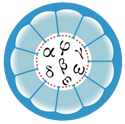Teaching a foreign language today
Teaching a foreign language today
Awarded by GINCO-Grundtvig International Network of Course Organizers (Best Practice for Quality Care in 2012)
The 3-day and the 5-day seminars start the same day and finish in different days (Day 3 and Day 5)
2020-2021:
5-day seminar:
23-27 October 2020, Athens
9-13 July 2021, Megalochori, Santorini
3-day seminar:
23-25 October 2020, Athens
9-11 July 2021, Megalochori, Santorini
Working language: Greek and English
SEMINAR PROGRAMME
Day 1 (Friday)
- Presentation of the participants and their organizations
- Presentation of the seminar’s programme and the trainers (educational contract)
- Locating the characteristics, the needs and the expectations of our learners
Day 2 (Saturday)
- The adults as learners
- Grading tests and curriculum planning
- Planning a lesson/ an educational meeting
Day 3 (Sunday)
- Teaching a text: Didactic techniques and techniques for assimilating the text
- Teaching vocabulary: Didactic techniques and techniques for assimilating the vocabulary
- The selection and evaluation of the textbook and the teaching materials
Day 4 (Monday)
- Visit to a Greek Language lesson for adults: Observation of the courses’ place, discussion with administration, trainers and students, observation of the lesson
Day 5 (Tuesday)
- Visit to a Greek Language lesson for adults: Observation of the courses’ place, discussion with administration, trainers and students, observation of the lesson
- Reports on the visit: Presentation of participants’ remarks, thoughts and conclusions
- Evaluation of the seminar - Goodbye activities - Creating a communication network
Fees
Tuition fee: 70 €/ day/ person, which includes tuition and training materials.
Organizational costs: 100 €/ person, which includes administration costs, organizational costs and VAT.
Special discounts for non Erasmus Plus grant holders.
Learning Outcomes
At the end of the seminar, participants are expected to have acquired the skills that will enable them to:
- locate and assess the needs and expectations of their language learners
- select the didactic techniques for organizing an efficient course
- adjust, produce, apply and evaluate the appropriate teaching materials
- cooperate with each other and exchange teaching experiences, ideas and materials
- become aware of their learners' cultural and educational background and to use their cultural specificities for the needs of the course
- cope with different practical problems in their classrooms, through the exchange of experiences and ideas with their colleagues
- guide other educators and organize activities related to the target language and culture.
Methodology
The course is based on the principles of participatory adult education, by embodying participants' experiences and fostering the exchange of their ideas, proposals and materials. Its focus is not merely on the didactic aspect of teaching but also on the participants' social and cultural knowledge gained through education and teaching to different target groups throughout Europe. During the course, the following techniques will be implemented: working in subgroups and pairs, role play, lectures, guided conversation, brainstorming, language and educational games and experiential activities.
The course also includes observation sessions in a Greek Language lesson for adults. During this, participants will have the opportunity to assess the teaching session of Greek in the specific context by applying the techniques of observation, interviewing and group discussion. After its completion, participants will share their learning experience.
Participants will also be given hand-outs, original materials, lists of intercultural activities and websites for teaching tools. Taking into consideration that the variety of educational tools and equipment offers to participants the opportunity to enrich their educational experience, within the course there will also be implemented the means of video, audio, objects (realia), diagrams, photos and games-activities.
Preparation
Participants will be given information on the subject of teaching languages today in Europe as well as lists for the most recent publications of didactic materials. Before the course, they will be asked to describe the institution they work for and the basic characteristics of their learners and their own professional background. it is also required to bring and present samples of the didactic material they use. Participants will also receive some information for the course group (trainers, organizers and organizing institution, other participants). Organizers will be responsible for sending all the necessary information regarding the venue and the trip. All the above will be communicated via e-mail and Drop Box.
Follow-up
Upon completion of the course, participants will be encouraged to form a network which will function as a meeting point. Within this network, they will be able to exchange didactic materials and proposals as well as useful ideas for promoting language learning in different European countries.


